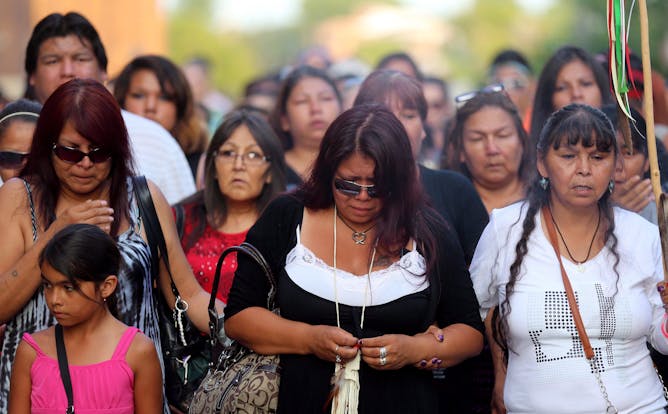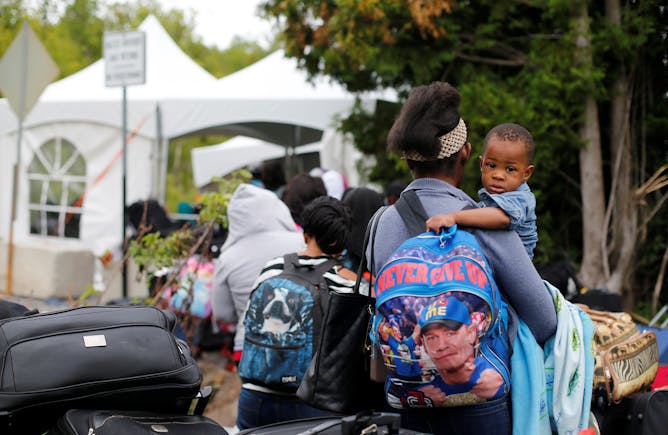|
A piece of legislation known as Bill S-240 has recently received unanimous consent from both the Senate and the House of Commons. The bill seeks to put a stop to Canadian complicity by criminalizing organ tourism. Today in The Conversation Canada, Maria Cheung of the University of Manitoba looks at the troubling practice of organ trafficking and forced organ harvesting in China.
That’s not all: we look at a disturbing example of racial profiling at a major Canadian academic conference; how grassroots campaigns by Indigenous activists have played an important part in dealing with the tragedy of missing and murdered Indigenous women and girls; why researchers are trying to revive a Ugandan tradition called the wang-oo, or communal fireplace; some common sense advice on how men can become better fathers; and a look at the growing number of
U.S. citizens who are seeking asylum in Canada.
And finally…when was the last time you actually talked to a human being at your bank? The ubiquitous and convenient ATM means we no longer need to speak to bank tellers. Mortgages can be arranged by email. But Laura Doering of the University of Toronto says we should all take the time to get to know our bankers – research shows it can lead to positive results for a variety of reasons.
Regards,
|

It is currently legal for Canadians to travel abroad and obtain organs from illicit sources. If it gains final approval from the Senate, Bill S-240 will change this.
(Shutterstock)
Maria Cheung, University of Manitoba
When a Canadian travels to China to receive an organ transplant, a member of a persecuted minority may be killed to provide the organ.
|

During Game 3 of the NBA Finals, Mark Stevens, a co-owner of the Golden State Warriors, shoved Toronto Raptors player Kyle Lowry. Stevens’s actions can be read as a public act of racism and a declaration of ‘ownership’ of Black bodies.
THE CANADIAN PRESS/Frank Gunn
Roberta K. Timothy, York University, Canada
Last week a young Black scholar at a Canadian conference was detained. Defending oneself against racial profiling has a detrimental impact on the health of racialized people.
|

Dutourdumonde Photography/Shutterstock
Bonnie Fournier, Thompson Rivers University
Addressing HIV stigma through utilising the Acholi’s own local cultural system is an empowering process that will position the role of the elders back into the community.
|

Tina Duck, centre, attends a vigil for her daughter, Tina Fontaine, in Winnipeg in August 2014.
THE CANADIAN PRESS/Trevor Hagan
Vicki Chartrand, Bishop's University
The tireless grassroots efforts of Indigenous activists unearth colonialism’s hidden secrets and the stories of the land and people to bring the murdered and missing women and girls home.
|

On TV shows, father and sons often embark on an adventurous camping trip like this one in Bonaventure, Canada.
Alex Guillaume / Unsplash
Adam Davies, University of Toronto
What does it mean to be a good father to your son? Drop the traditionally masculine roles and embrace your emotions.
|

Asylum-seekers, seeking to enter Canada from New York state in 2017.
Reuters/Christinne Muschi
Sean Rehaag, York University, Canada
Unlike prior waves like the enslaved people on the Underground Railroad or Vietnam-era war resisters, they are children whose parents fear deportation after spending years in the United States.
|

Research shows the benefits of having a face-to-face relationship with your bank.
(Shutterstock)
Laura Doering, University of Toronto
Research suggests there are hidden costs to abandoning personalized banking relationships in favour of online banking.
|

Les Canadiens ont une confiance relativement élevée dans leurs médias comparativement à d'autres pays, mais cela ne signifie pas qu'ils veulent payer pour leurs nouvelles.
Shutterstock
Colette Brin, Université Laval; Rasmus Kleis Nielsen, University of Oxford
Les Canadiens ont une confiance relativement élevée dans leurs médias comparativement à d'autres pays, mais cela ne signifie pas qu'ils veulent payer pour leurs nouvelles.
|